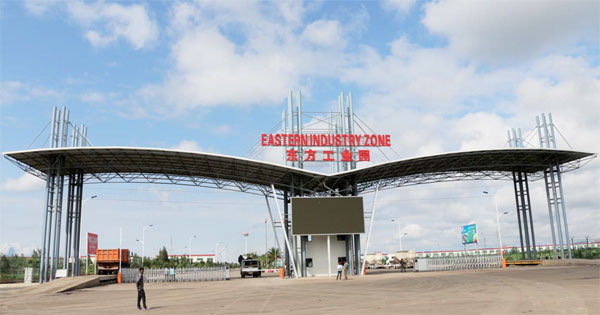

The Eastern Industry Zone in Dukem, about 37 km from Addis Ababa, is home to about 20 Chinese-invested manufacturing companies employing thousands of local workers. Chen Weihua / China Daily
The director of Ethiopia's first Chinese investor-occupied industrial zone is promising to expand the concept to other areas of the country.
Jiao Yongshun, who is the assistant director of the administrative committee of the Eastern Industry Zone in the capital Addis Ababa, says it plans to double the number of buildings on the site to 21 to keep up with a growing demand.
It now covers 5 square kilometers of land in the town of Dukem, about 37 km from Addis Ababa. Work on the zone first started in 2009.
It now offers a total of 130,000 square meters of industrial space, fully equipped with the facilities needed for modern manufacturing including guaranteed power and water supply, an efficient sewage system, roads and landscaping.
Already, 20 Chinese companies have moved into the burgeoning complex, involved in manufacturing including textiles, shoes, automobiles, steel and cement.
The core Chinese government aim of transferring some of its industrial overcapacity to the continent has been welcomed by Ethiopia and other countries, says Jiao.
He adds that with a population of more than 90 million, Ethiopia's leaders have said they are keen to learn lessons from China's modernization drive over the last three and four decades.
With a double-digit GDP growth rate over the past decade, Ethiopia has been one of Africa's fastest growing economies.
The zone's eye-catching front gates - in the shape of spreading wings - sit strategically on the Addis Ababa-Djibouti Highway, the main artery linking Ethiopia to an important neighboring port.
Plans are already in place for a 10,000 sq m office building, an 11,000 sq m showroom and reception center, three 18,500 sq m accommodation blocks, and a 3,000 sq m canteen.
The facility's financing comes from Jiangsu Yongyuan Investment Co Ltd, which is part of the Jiangsu Qiyuan Group, an industrial research and development, production and sales corporation.
The zone is also listed as part of the Ethiopian government's Sustainable Development and Poverty Reduction Program.
The Addis Ababa government has offered various preferential policies to companies occupying space in the zone, including extended tax holidays.
Jiao says its highway location has been a major advantage, positioned between two towns with a population of 300,000, meaning easy access to a large workforce.
Chinese footwear manufacturer Huajian Group, which exports its products mainly to North America, is the zone's largest employer, with 3,200 local workers.
Moving to Africa is increasingly appealing to many Chinese manufacturers, as labor costs at home continue to rise.
Ethiopian workers still earn about a tenth of those in China.
Chinese producers are also facing growing pressure from rising anti-dumping charges in the West, making Ethiopia an ideal location to service customers in both the US and European markets, as well as the rest of Africa, says Jiao.
Copyright ©1999-2018
Chinanews.com. All rights reserved.
Reproduction in whole or in part without permission is prohibited.